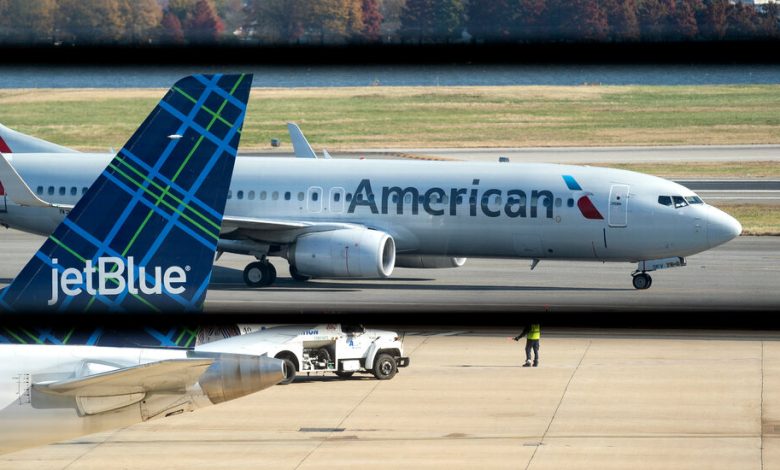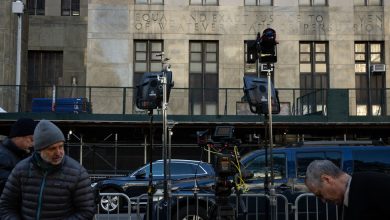U.S. Suit Over Alliance of American Airlines and JetBlue Goes to Trial

A Justice Department effort to break up an alliance between American Airlines and JetBlue Airways is set to go to trial in Boston on Tuesday morning, part of a broad Biden administration push to aggressively enforce antitrust rules and promote economic competition.
Under the partnership, announced in 2020 and referred to as the Northeast Alliance, American and JetBlue joined forces in Boston and New York. In those cities, the airlines share some revenue and access to airport gates and allow customers to buy trips and take part in loyalty programs at the airlines interchangeably.
American, the world’s largest airline by market share, and JetBlue say the alliance helps them to compete against the dominant carriers in those cities, United Airlines and Delta Air Lines. The Justice Department sued last year to stop the partnership, arguing that it is effectively a partial merger and reduces competition.
“This case is straightforward,” the Justice Department wrote this month in a legal brief describing its arguments. Referring to the alliance, it added: “The NEA eliminates competition between the largest airline in the world and a disruptive competitor on flights to and from Boston and New York. It deprives the public of the benefits that the rivalry has brought to passengers for two decades.”
In July, President Biden called out airlines in a sweeping executive order promoting economic competition, arguing that the industry had become too top-heavy. Led by American, the nation’s four largest airlines control two-thirds of the domestic market, according to Transportation Department data. Alaska Airlines is a distant fifth, followed closely by JetBlue.
At the time, Mr. Biden asked the Transportation Department to consider new rules requiring airlines to issue refunds when services aren’t provided and to clearly disclose fees to consumers. The department has proposed rules on refunds since then and, on Monday, proposed another on fee disclosures.
The Boston trial, scheduled to last about three weeks, builds on that administration effort to counter the effects of consolidation. Each side will make its case in U.S. District Court before Judge Leo T. Sorokin, whose decision could come weeks or even months after the trial concludes. Top executives from both airlines are expected to testify, as are a handful of economists. JetBlue’s chief executive, Robin Hayes, is expected to be the first witness.
The Justice Department plans to argue that the airline alliance eliminates competition in an industry that became heavily concentrated after a series of mergers in the 2000s and early 2010s.
The alliance neutralizes the otherwise fierce competition between American and JetBlue in Boston and New York, the government argued in the brief this month. It also blurs the line between the airlines and severely hinders competition in dozens of markets domestically and between London and the United States, the Justice Department said.
American and JetBlue account for more than 85 percent of all revenue earned from flights between Boston and Phoenix, Rochester, N.Y., Charlotte, N.C., Philadelphia and Washington National Airport, the government said. The airlines also have a claim to more than half of all revenue earned from flights between New York and Los Angeles, Miami, Orlando, Fla., West Palm Beach, Fla., and Phoenix. According to one estimate, the alliance could cost travelers as much as $700 million, federal prosecutors said.
The airlines reject that argument and plan to make the case that over the year and a half that the partnership has been in place, it has neither limited competition nor increased prices. In fact, they say, the alliance has yielded some consumer benefits.
“Considering that there is no evidence of adverse effects, the NEA has been all upside for traveling consumers,” the airlines said in a legal filing this month.
American and JetBlue said they had increased travel options by introducing dozens of new nonstop routes, trading out smaller planes for larger ones with more seats and offering customers more flight options and more ways to use and earn loyalty rewards.
The airlines also noted that United and Delta are formidable forces in both Boston and New York, making it difficult for America and JetBlue to grow. And they rejected the government’s contention that the tie-up amounts to a merger. Under their deal, the airlines agreed not to coordinate on pricing, aircraft fleet plans or flight capacity.
JetBlue is separately facing federal antitrust scrutiny over a proposed $3.8 billion merger with Spirit Airlines, which will be put to a vote among JetBlue’s shareholders next month.




